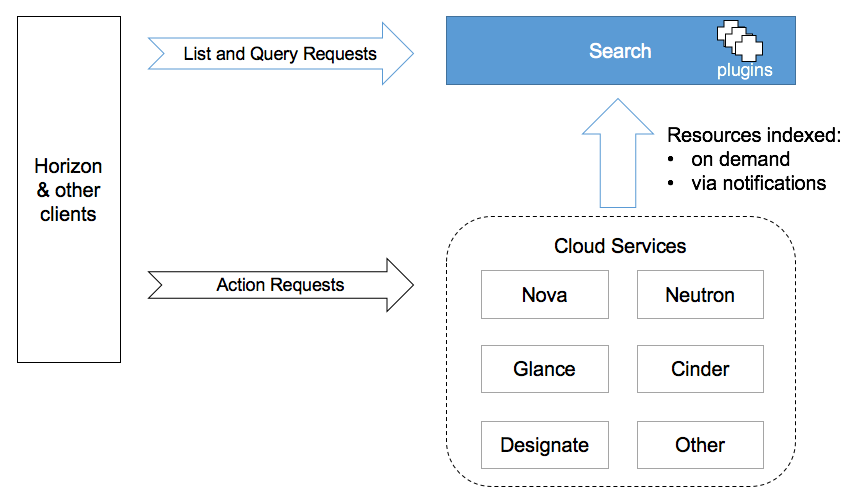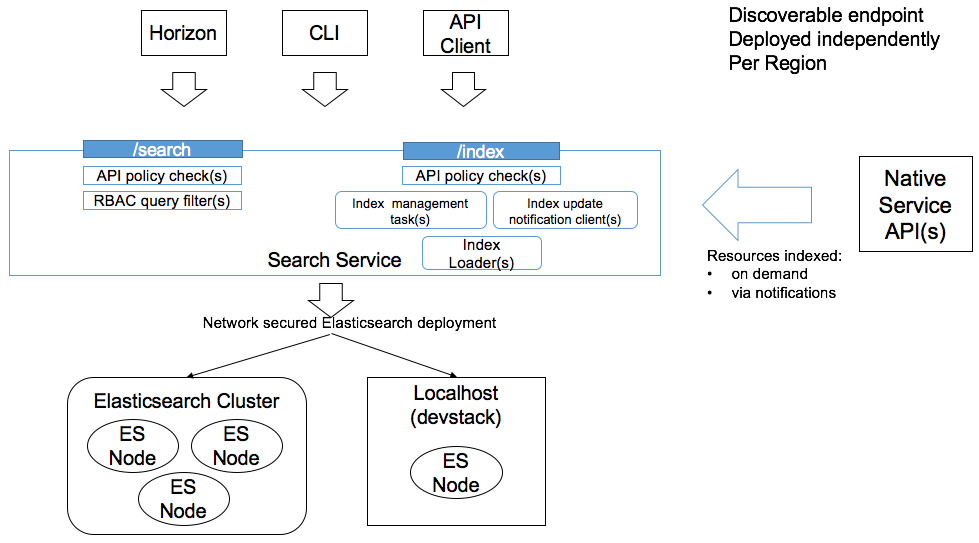Difference between revisions of "Searchlight"
Travis Tripp (talk | contribs) (Created page with " = Mission Statement = To provide advanced and scalable indexing and search across multi-tenant cloud resources. = Project Links = {| border="1" cellpadding="2" | Source co...") |
Travis Tripp (talk | contribs) (Added Diagrams) |
||
| Line 29: | Line 29: | ||
|} | |} | ||
| − | = | + | = Overview = |
Searchlight was originally developed and released in the Kilo release of Glance as the Catalog Index Service [1]. At the Liberty Summit we decided to broaden the scope to provide advanced and scalable search across multi-tenant cloud resources. | Searchlight was originally developed and released in the Kilo release of Glance as the Catalog Index Service [1]. At the Liberty Summit we decided to broaden the scope to provide advanced and scalable search across multi-tenant cloud resources. | ||
| Line 37: | Line 37: | ||
This is intended to dramatically improving the search capabilities and performance of various OpenStack cloud services. | This is intended to dramatically improving the search capabilities and performance of various OpenStack cloud services. | ||
| − | It | + | It accomplishes this by offloading user search queries from existing API servers by indexing their data into ElasticSearch. ElasticSearch is a search server based on Lucene. It provides a distributed, scalable, near real-time, faceted, multitenant-capable full-text search engine with a RESTful web interface and schema-free JSON documents. ElasticSearch is developed and released as open source under the terms of the Apache License. Notable users of ElasticSearch include Wikimedia, StumbleUpon, Mozilla, Quora, Foursquare, Etsy, SoundCloud, GitHub, FDA, CERN, and Stack Exchange. (Source: http://en.wikipedia.org/wiki/Elasticsearch). The elastic-recheck project also uses Elasticsearch (and kibana) to classify and track OpenStack gate failures. (Source: http://status.openstack.org/elastic-recheck) |
=== Screencasts === | === Screencasts === | ||
| Line 50: | Line 50: | ||
* [http://specs.openstack.org/openstack/glance-specs/specs/kilo/catalog-index-service.html] | * [http://specs.openstack.org/openstack/glance-specs/specs/kilo/catalog-index-service.html] | ||
| + | |||
| + | ==== Diagrams ==== | ||
| + | |||
| + | [[File:Searchlight-Concept-1.png]] | ||
| + | [[File:Searchlight-Concept-2.png]] | ||
== Get Involved == | == Get Involved == | ||
Please join with us to help move forward together as a community! We are sure that the ideas and concepts can use refinement and we'd like to identify where we can best fit in to the ecosystem. | Please join with us to help move forward together as a community! We are sure that the ideas and concepts can use refinement and we'd like to identify where we can best fit in to the ecosystem. | ||
Revision as of 21:43, 29 May 2015
Contents
Mission Statement
To provide advanced and scalable indexing and search across multi-tenant cloud resources.
Project Links
| Source code (current - forked from Glance) | https://github.com/lakshmisampath/searchlight/ |
| Source code (proposed) | https://github.com/openstack/searchlight |
| Bug tracker | https://bugs.launchpad.net/searchlight |
| Feature tracker (see Glance for historical tracking) | https://blueprints.launchpad.net/searchlight |
| IRC | #openstack-searchlight |
| Meeting Times | http://eavesdrop.openstack.org/#Search_Team_Meeting |
| Meeting Agenda | https://etherpad.openstack.org/p/search-team-meeting-agenda |
Overview
Searchlight was originally developed and released in the Kilo release of Glance as the Catalog Index Service [1]. At the Liberty Summit we decided to broaden the scope to provide advanced and scalable search across multi-tenant cloud resources.
[1] http://specs.openstack.org/openstack/glance-specs/specs/kilo/catalog-index-service.html
This is intended to dramatically improving the search capabilities and performance of various OpenStack cloud services.
It accomplishes this by offloading user search queries from existing API servers by indexing their data into ElasticSearch. ElasticSearch is a search server based on Lucene. It provides a distributed, scalable, near real-time, faceted, multitenant-capable full-text search engine with a RESTful web interface and schema-free JSON documents. ElasticSearch is developed and released as open source under the terms of the Apache License. Notable users of ElasticSearch include Wikimedia, StumbleUpon, Mozilla, Quora, Foursquare, Etsy, SoundCloud, GitHub, FDA, CERN, and Stack Exchange. (Source: http://en.wikipedia.org/wiki/Elasticsearch). The elastic-recheck project also uses Elasticsearch (and kibana) to classify and track OpenStack gate failures. (Source: http://status.openstack.org/elastic-recheck)
Screencasts
To help explain the ideas of the project, we have a quick screencast demonstrating the concepts. This was done by taking the Glance Catalog Index Service and adding in a plugin for Nova and then modifying horizon to use it. This is what was demonstrated at the Liberty Design Summit in both a Glance fishbowl session and a Horizon fishbowl session.
Design
The design is based off the Catalog Index Service in Glance. It will be refined moving forward as cross project needs are discovered and defined.
Diagrams
Get Involved
Please join with us to help move forward together as a community! We are sure that the ideas and concepts can use refinement and we'd like to identify where we can best fit in to the ecosystem.


